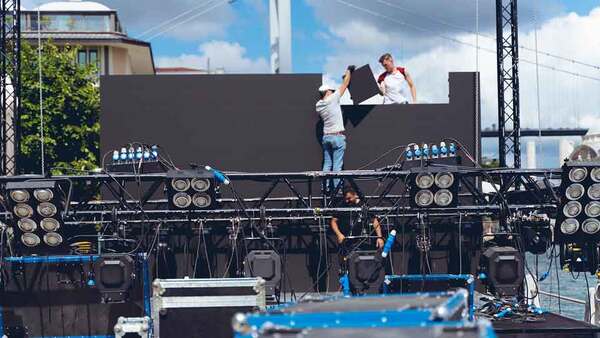
Installation method of LED display screen
Introduction:
LED display screens have become an indispensable part of modern information dissemination and advertising displays due to their excellent visual performance and diverse application scenarios. However, in order to let the LED display screen really play its advantages, it is crucial to choose the appropriate installation method. Different installation methods not only affect the appearance and function of the display, but also directly related to its subsequent maintenance convenience and service life.
Combined with site conditions and customer needs, this article summarizes six common LED display installation methods to help you find the right solution.

Wall embedded installation
The wall embedded installation is a highly aesthetically pleasing installation method, where the LED display is embedded by cutting holes in the wall to achieve seamless integration with the wall. This method is suitable for places with high aesthetic requirements for space, such as fine pitch LED screens in retail stores, conference rooms or monitoring centers, and allows the LED display to become part of the environment.
However, due to heat dissipation problems, the wall must be penetrated for maintenance. LED displays installed in this way are usually front-maintained, and LED modules are attached to the cabinet structure using a strong magnetic material.


Hanging installation
Hanging installation is known for its simplicity and practicality, especially for small and lightweight LED displays. Whether in exhibition halls, conference rooms, or on stage, the pendant mounting method allows the display to hang in the air, making it a striking visual centerpiece. With flexible height adjustments and optional decorative elements, this method can adapt to a variety of aesthetic and functional needs.


Wall mounted installation
Wall mounted installation is a simple and efficient way to install LED displays, fixing them directly to load-bearing walls. It saves space and is easy to maintain, especially suitable for offices, classrooms and small shops. For small pitch LED screens, the front maintenance mode is sufficient, while large LED screens are usually designed with a rear maintenance space to meet the needs of daily maintenance.


Standing Installation
Floor standing installation is flexible and versatile, both fixed and movable type with rollers can meet the needs of different scenarios. Fixed type is suitable for long-term display of advertising screens, while movable type provides great convenience for exhibitions or temporary events. Especially in outdoor billboards or large-scale rental events, floor-mounted installation becomes the best choice with stability and mobility. Therefore, rental LED screens are usually installed in this way.


Hanging wall installation (swing arm mount)
For ease of maintenance and improved heat dissipation, the hanging wall installation is designed as a flexible solution. With a movable or fixed swing arm frame, the LED display can be rotated or moved when needed, making it particularly suitable for concerts, broadcast rooms or outdoor areas with limited back space. The flexibility of swing arm mounting not only solves the challenge of rear maintenance, but also enhances the practicality and design of the display.


Pillar Installation
Pillar installation is a widely used outdoor installation that can support LED displays of all sizes thanks to the solid structure of a single or double pillar. On billboards along highways, scoreboards in stadiums, and large screens in city squares, column mounting displays unparalleled height and visibility, making it an ideal choice for outdoor LED displays.


Conclusion
Choosing the right LED display installation methods has a direct impact on the display effect, maintenance and service life. According to the weight, size, site conditions and use of the LED display screen for comprehensive consideration, to ensure the best use of the effect. From embedded to pillar installation, each method has its own unique advantages and can meet different application requirements. The skillful use of these installation methods will surely add more possibilities and value to your LED display.
